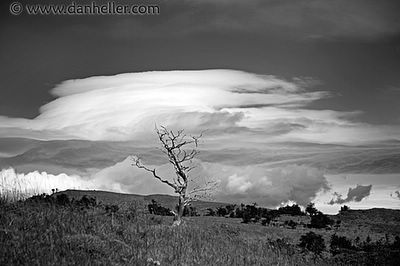
One of the important side effects of bad weather, is that we use more energy when weather is bad. Air conditioners raise the cost of dealing with very hot weather, heaters for very cold, and storm damage is simply expensive when structures come crashing down. But there's another implication. Oil has risen again, to a record $67, and the main reason this time is, wait for it, concerns about a storm in the Gulf of Mexico. Not even a big storm, just a Tropical Storm. When oil prices are effected by the world's weather, you begin to see how unstable the resource is.
Also disturbing is that Americans are weathering the current high gas prices at the pump by simply paying with their credit cards. Consumption without really paying, in the leading gas gazzling country on the world, with over 200 million cars. Consumption without really paying means Demand Addiction. In a world where fossil fuel resources are starting to wear thin, this is troubling.
Have you noticed that we are beginning to see a trend in Europe? Flooding. Or are we?* Is it the third or fourth year in a row this year, that Europe's had serious floods, and in quite a few countries? Research indicates that it is not a trend. This leads to the Law Of Risk vs Reward, aka Sloth vs Preparation: do nothing and hope it doesn't happen again, or do something and limit your losses if in fact, it's a trend in the making. Of course doing something and then nothing happens, may mean using up resources that you could have used. Herein lies our dilema.
Remember there was a serious flood on the Danube in 2002, causing damage most notably in Prague and across Germany. Research conducted then said there was no trend (see scientific findings from 2003 below).
How is the weather where you are? Anything unusual? This summer in South Korea has been the hottest in the 4 years I have been here. Last year was sometimes uncomfortable. This year, often unbearable. I'm sorry, that's not very scientific.
Oil Prices Soar Above $67 Per Barrel
By BRAD FOSS, AP Business Writer 29 minutes ago
Oil prices surged above $67 a barrel Wednesday on concerns about a storm that could hit production sites in the Gulf of Mexico and a U.S. government report that showed a decline in the nation's gasoline supply.

*Severe floods in Europe not rising (article published on 10 September 2003)
# NewScientist.com news service
# Jenny Hogan and Carolyn Fry
Severe floods in central Europe are not becoming more common, say scientists in Germany who have compiled a historical record that stretches back almost 1000 years.
Even the devastating floods that left cities from Prague to Dresden awash with water in 2002 do not suggest an upward trend, Manfred Mudelsee at the University of Leipzig and his colleagues found.
Many reports at the time suggested that the floods were the kind of extreme weather event expected to become more frequent as a result of global warming. But "if they can't find trends, then there is no reason to attribute the flooding to climate change" says Mike Blackburn, a climate scientist at the University of Reading, UK.
However, while the frequency of major floods may not be increasing, the economic damage and the number of people at risk of flooding may well be going up. This is due to, for example changes in land-use and in the possessions damaged by flooding.
The damage caused by the 2002 floods cost the insurance industry $4.1 billion, says Jens Mehlhorn, head of the flood group at Swiss Re in Zurich. The average loss over the previous 15 years was $1 billion a year, and there is an "upward trend in losses".
No comments:
Post a Comment